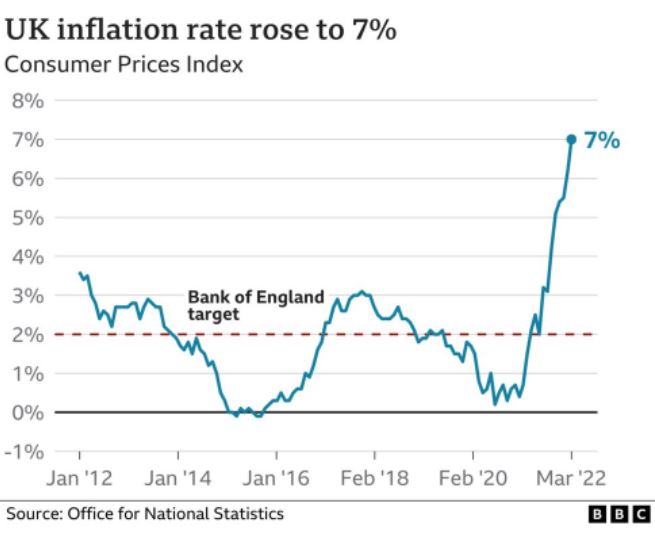Inflation rises on the back of soaring fuel costs
By Jeph Ajobaju, Chief Copy Editor
Inflation rate in the United Kingdom rose from 6.2 per cent in February to 7 per cent in March, the highest level since 1992, according to latest figures from the Office for National Statistics (ONS).
Prices are rising at their fastest rate for 30 years, driven by a sharp increase in petrol and diesel costs.
Prices are rising faster than wages and there is pressure on the government to do more to help those struggling, the BBC reports.
The cost of living is expected to rise even further after the energy price cap was increased, driving up gas and electricity bills for millions.
Inflation is the rate at which prices rise. If a bottle of milk costs £1 and that rises by 5p, then milk inflation is 5 per cent.
Fuel had the biggest impact on the inflation rate, with average petrol prices rising by 12.6p per litre between February and March, the largest monthly rise since records began in 1990, said the ONS.
This compares with a rise of 3.5p per litre between the same months of 2021.
Diesel prices also rose by 18.8p per litre this year, compared with a rise of 3.5p per litre a year ago.
The BBC explains that the rise in the inflation rate was higher than the 6.7 per cent expected by analysts and was also driven up by furniture, restaurant and food prices.
The figures for March do not yet reflect the average £700-a-year increase in energy bills that took place from 1 April when the energy price cap was raised.
__________________________________________________________________
Related articles:
UK offers £20,480 salary for care assistants – Nigerians wanted
UK employs 9,189 Nigerian doctors, and they are thriving
Britons buffeted by higher living costs are begging bread
UK economy grows fastest in 80 years
British embassy resumes Priority Visa issuance in Nigeria
__________________________________________________________________
Johnson and Sunak under pressure
British consumer price inflation leaped to its highest level in three decades, intensifying the pressure on embattled Prime Minister Boris Johnson and his finance minister Rishi Sunak to ease the cost-of-living squeeze, CNN adds.
Its highest since March 1992 and by more than expected by most economists in a Reuters poll.
The month-on-month rise was the highest for the time of year since ONS records began in 1988. Broad-based price rises, ranging from vehicle fuel to food and furniture, were behind the increase.
Households are facing the biggest cost-of-living squeeze since records began in the 1950s, according to Britain’s budget forecasters, and the inflation overshoot is further bad news for the government too.
Johnson and Sunak were fined by police on 12 April for attending a June 2020 birthday party for Johnson at his Downing Street office at a time of COVID-19 restrictions, leading to calls from political opponents for them to resign.
Sunak’s popularity dips
Sunak – previously seen as a leading candidate to succeed Johnson as prime minister – has seen his popularity slide after a budget statement in March, which the public judged did too little to ease cost-of-living pressures.
“I know this is a worrying time for many families which is why we are taking action to ease the burdens by providing support worth around £22 billion ($29 billion) in this financial year,” Sunak said after the data.
Jack Leslie, senior economist at the Resolution Foundation think tank, said Sunak would come under pressure to do more.
“The sheer scale of this inflation-led squeeze on living standards makes it all the more remarkable how little support the Chancellor provided in his Spring Statement – a decision that will surely have to be revisited before the Autumn Budget,” Leslie told CNN.
British inflation has seen an unprecedented rise over the past year, following a similar pattern to most other advanced economies as energy prices surged and pandemic supply-chain difficulties persisted.
Russia’s invasion of Ukraine on 24 February has pushed energy prices even higher, and last month Britain’s Office for Budget Responsibility forecast inflation would peak at a 40-year high of 8.7 per cent in the final quarter of 2022 (Q4 2022).
Rising rates
Financial markets are all but certain the Bank of England (BoE) will raise interest rates to 1 per cent from 0.75 per cent on 5 May before taking them to 2 per cent-2.25 per cent by the end of 2022, though many economists expect it to be less aggressive.
The BoE forecasts economic growth will slow sharply over the course of this year as cost of living pressures mount.
Samuel Tombs, chief UK economist with Pantheon Macroeconomics, forecast inflation will hit 8.8 per cent in April after household utility bills rocketed but then fall below the BoE’s 2 per cent target in the second half of next year.
The data from the ONS shows that core CPI, which excludes food, energy, alcohol and tobacco prices, rose to 5.7 per cent in March from 5.2 per cent in February.
Retail price inflation – an older measure which the ONS says is inaccurate, but which is widely used in commercial contracts and to set interest payments on inflation-linked government bonds – rose to 9.0 per cent, its highest since 1991.
According to CNN, there were signs of further inflation pressure ahead as manufacturers increased their prices by 11.9 per cent over the 12 months to March, the biggest jump since September 2008.
Manufacturers’ raw material costs leaped by 19.2 per cent, the biggest increase in records began in 1997.











